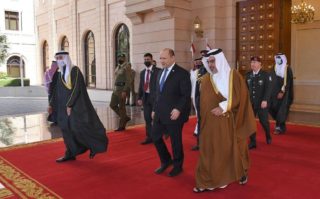
MANAMA, Bahrain — Prime Minister Naftali Bennett of Israel met Tuesday in Bahrain with the Bahraini king and crown prince, part of a warm welcome that provided the latest evidence of the rapid realignment of Middle Eastern politics.
The first visit by an Israeli prime minister to Bahrain, a tiny but strategically located Gulf state, Mr. Bennett’s trip underscored the speed at which Israel has cemented ties with several Arab governments since the country formalized diplomatic relations with Bahrain and the United Arab Emirates, re-established relations with Morocco, and improved them with Sudan, all in 2020.
But the delicate dynamics of the visit also highlighted how Israel’s new relationships largely remain government-level agreements that are still far from becoming society-wide compacts between Israeli and Arab publics.
Mr. Bennett acknowledged as much in his comments to Crown Prince Salman bin Hamad al-Khalifa, the Bahraini prime minister, at the start of their meeting.
“Our goal in this visit is to turn it from a government-to-government to a people-to-people peace,” he said, “and to convert it from ceremonies to substance.”
“To substance, exactly,” Prince Salman replied, describing the meeting as “cousins getting together.”
On that score, the visit was only a start.
Mr. Bennett shared warm exchanges with Prince Salman, was treated to a guard of honor that played the Israeli national anthem and held a lighthearted question-and-answer session with a group of young Bahrainis — a rare exchange between Arab civilians and an Israeli leader.
“When can we visit?” asked Saud al-Hadi, an employee at the Bahraini Central Bank.
Mr. Bennett replied: “You want to come on my plane?”
But these interactions were carefully managed.
Mr. Bennett’s meetings with the prince and King Hamad bin Isa al-Khalifa were held away from the journalists who traveled with his entourage. The young Bahrainis were handpicked members of the country’s upper-middle class — mainly bankers and businesspeople whose questions were vetted in advance.
The visit was featured prominently in the local news media, which are tightly controlled by the Bahraini government.
Opposition leaders and rights activists condemned the visit, which occurred on the 11th anniversary of a failed uprising against the Bahraini royal family, a Sunni Muslim dynasty that has ruled Bahrain’s mainly Shiite population since 1783.
An opposition group posted video and images of small protests against the decision to invite Mr. Bennett.
Still, Mr. Bennett said he had been moved by the meetings.
“As someone who’s fought in many wars throughout the years, to be in the capital of an Arab country and to hear Hatikva” — the Israeli national anthem — “it’s touching,” he said in a briefing with journalists shortly before he returned to Israel. “For a typical Israeli who came of age in the 80s, this is big stuff.”
While that change was undeniable, the broader change he was seeking was not likely to happen overnight.
“The tectonic plates of the region are shifting,” said Anshel Pfeffer, an Israeli political commentator who traveled with Mr. Bennett. “While the direction of that shift is clear, these are causing tremors, not earthquakes.”
The visit itself highlighted how priorities have changed for some countries in the region.
For years, the vast majority of the Arab world refused to normalize relations with Israel as long as the Israeli-Palestinian conflict remained unresolved.
But for Bahrain and the Emirates, the containment of Iran and its armed proxies throughout the region — a goal shared with Israel — now appears to be of greater importance than an immediate resolution to the Israeli-Palestinian conflict, particularly as Iran accelerates its nuclear enrichment.
Bahrain will for the first time host an Israeli military officer as part of a regional alliance, an Israeli official confirmed Tuesday. It will be the first time an Israeli officer is posted in a Persian Gulf country, the Israeli military said.
The goal is to ensure freedom of navigation and international trade in the Persian Gulf, following several attacks by Iran and its proxies on ships in the area.
Bahrain’s invitation to Mr. Bennett also hinted at growing acceptance of Israel’s role in the region by Saudi Arabia, the most influential state in the Arab world and a major Iranian rival.

Officially, Saudi officials deny that the kingdom plans to follow Bahrain by normalizing ties with Israel.
But Saudi support is crucial for Bahrain — Saudi troops rushed to Bahrain in 2011 to help its government crush an uprising, and the Saudi government bailed out the Bahraini economy in 2018 — and analysts say that Bahrain, as a Saudi proxy, does little without its agreement.
“Bahrain is always looking up to Saudi Arabia as their big brother that always stands by them in times of difficulties,” said Abdulkhaleq Abdulla, an Emirati political scientist and expert on Gulf politics.
Mr. Abdulla added, “There is more coordination than many people would assume between Bahrain, Saudi Arabia” and other Gulf States.
Leading Saudis have also made statements about Israel and the Palestinians that would have been unthinkable until only recently. In 2018, the crown prince, Mohammed bin Salman, made headlines by asserting that Israelis had a right to their own land. Two years later, another Saudi prince, Bandar bin Sultan, criticized the Palestinian leadership as failing ordinary Palestinians.
Saudi movie theaters are currently showing a feature film, “Death on the Nile,” that stars an Israeli actress, Gal Gadot, who was widely criticized in the Arab world for her public support of Israeli military action in Gaza.
A group of Saudi journalists also attended Mr. Bennett’s chat with young Bahrainis, in a sign of growing Saudi interest in Israel.

Mr. Bennett also met with Vice Admiral Brad Cooper, the commander of the U.S. Navy’s Fifth Fleet, which is based in Bahrain; several Bahraini ministers; and members of Bahrain’s Jewish community, to whom he gave a shofar, a Jewish ceremonial horn.
Both governments said they had made real progress in terms of economic and business cooperation. The Israeli government announced an agreement with Bahrain to finance joint business projects in the fields of climate-related technology, manufacturing and e-commerce.
Mr. Bennett said that an Israeli airline, Israir, would soon begin biweekly flights to Bahrain. Two Israeli businesses are close to completing two major investments in the Bahraini logistics and health care sectors, said Khalid Humeidan, the chief executive of a state-run Bahraini investment agency.
Ties are also warming between Israel and the two Arab countries with which it had previously forged an uneasy peace, Egypt and Jordan.
President Abdul Fatah al-Sisi of Egypt drew notice in Israel on Monday when he made a show of publicly greeting a visiting Israeli government minister, Karine Elharrar, in front of hundreds of other Arab dignitaries.
But if bonds between governments are strengthening, the sentiment among the Arab public is lagging.

Polling suggests a majority of Arabs across the region do not support the recent diplomatic thaw with Israel, though there is no polling data available for Bahrain. Exiled Bahraini rights activists called Mr. Bennett’s visit a betrayal of the Palestinian national movement and an endorsement of Israel’s policies toward it.
“It feels like a damning insult,” said Sayed Ahmed Alwadaei, advocacy director at the Bahrain Institute for Rights and Democracy, a London-based campaign group. “This is the most important date in Bahrain’s recent history, when Bahrainis stood up against an autocracy — and 11 years later they have invited the head of an apartheid state.”
And Mr. Bennett’s enthusiasm for the diplomatic thaw with distant countries like Bahrain was offset by mounting tensions with between Israelis and Palestinians back home, where a resolution between the two appeared more distant than ever.
Palestinians, Israeli settlers and the police have clashed for several days in Sheikh Jarrah, the East Jerusalem neighborhood that was at the heart of tensions that led to a war in Gaza last year.
Given this backdrop, some Palestinians said they were particularly hurt by the timing of Bahrain’s invitation to Mr. Bennett.
“We do not expect you to start a war with Israel,” said Maher Salah Najjar, a 59-year-old retiree in Nablus, West Bank. “But at least make sure that you do not hurt our feelings.”
FEATURED IMAGE: In a photograph made available by the Israeli government, Prime Minister Naftali Bennett of Israel, center, with Crown Prince Salman bin Hamad al-Khalifa of Bahrain, right, in Manama, Bahrain, on Tuesday.Credit…Haim Zach/Israeli Government, via Agence France-Presse — Getty Images
By Patrick Kingsley/The New York Times




